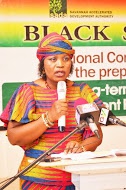 Ms. Helen Adjoa Ntoso, Volta Regional Minister
Ms. Helen Adjoa Ntoso, Volta Regional Minister
The Volta Regional Minister, Ms. Helen Adjoa Ntoso, has said that for Ghana to realise its development goals, it must draw on the energies of its people to grow an all-inclusive economy, build capacity and promote leadership and partnerships throughout the country.
She said Ghana is a unique country comprising distinct ethnic groups in a multi-party dispensation with a common destiny. "Together we can rise, and together we can fall. We can either rise faster together or continue to crawl forever as a nation," she added.
Ms. Ntoso was addressing the Volta Region forum towards the preparation of a national long-term development plan organised in Ho on 21-22 October 2015 by the National Development Planning Commission (NDPC). This followed earlier consultations in the Ashanti, Upper East, Northern, Upper West and Brong Ahafo regions.
The Regional Minister said, "Ghanaians are very passionate about issues concerning development, particularly those that affect them directly," and therefore “the people of the Volta Region are very privileged to have an opportunity to also make inputs into the long-term development plan for the nation.”
Speaking on behalf of the Volta Regional House of Chiefs, the Paramount Chief of Tefle Traditional Area, Togbe Nakakpo Dugbaza VIII, said some core issues need to be addressed in order to attain the developed status the nation so desires. These issues include chieftaincy disputes; land disputes; ethnic conflicts; disrespect for the laws of the land and discontinuity of government projects. The Volta Region, he added, suffers pockets of poverty among farmers and he looked forward to a national plan that would address the needs and challenges of these poor people so they could contribute their quota to economic development.
Effective education
"Even though the state has made some effort to make education free, we think our current educational system is defective," said Ms. Nioucha Emefa Yooman, representing Ola Senior High School. According to her, a lot of young people are not deriving the required benefits from the current system. "We therefore want an improved and more effective system of free education, especially at the second cycle and tertiary levels", she added.
Ms. Yooman reiterated the need for a practical and job-oriented educational system where attention would be given to technical and vocational schools to equip graduates with employable skills. The students called for the extension of senior high school from three years to four years, and the elimination of unnecessary partisan political interference.
Persons with Disabilities call for equal access
Calling for implementation in Ghana of the United Nations Convention on the Rights of Persons with Disabilities, Ms. Dokpo Mawunya Akwele said on behalf of the New Horizon Foundation of the Blind that a long-term development plan should promote fairness, respect for inclusiveness, equal access and effective participation of the visually impaired in all national activities.
Ms. Dorcas Dzamesi, of the Hohoe School for the Deaf, said communication has been a big challenge for hearing and speech impaired persons because most people in the society do not understand sign language. She proposed that parents of children diagnosed with such impairments be trained in sign language to enable them to communicate with the children before enrolling them in schools.
Re-dedication needed for development
The Director-General of NDPC, Dr. Nii Moi Thompson, observed that South Korea successfully transformed its economy over 40 years from 1960 to 2000 because Koreans had a common vision to transform their society. In 1962, Ghana's average per capita income was 73 percent higher than that of South Korea. Currently, however, the situation is now the opposite, with Ghana's average income now just 7 percent of that of South Korea. This, according to Dr. Thompson, brings to the fore a sense of wasted opportunities in Ghana over the years and the need to re-dedicate ourselves to reclaiming and building on those opportunities.
He said the regional consultations, the first phase of the 40-year development plan process, would be completed by the end of November 2015, and technical consultations would start early next year to advance the plan preparation process. Ghana has had many plans but the major challenge has been implementation, he added.
The Sustainable Development Goals (SDGs), which Ghana has adopted, will be binding on all member states of the United Nations. These goals are tied to the long-term plan, making the implementation of the SDGs and the long-term plan binding on all governments, he stressed.
Participants at the forum included experts from decentralised ministries, departments and agencies, civil society organisations and students. Also represented were the six main political parties in the last general elections: the New Patriotic Party, the National Democratic Congress, the Convention People's Party, the Progressive People's Party, the People's National Convention, and the Great Consolidated Popular Party.
Groups were formed after the opening session to exchange ideas for input into the long-term national development plan.
The five broad themes were: social development, economic development, environmental development, institutional development/governance, and Ghana in the international community.